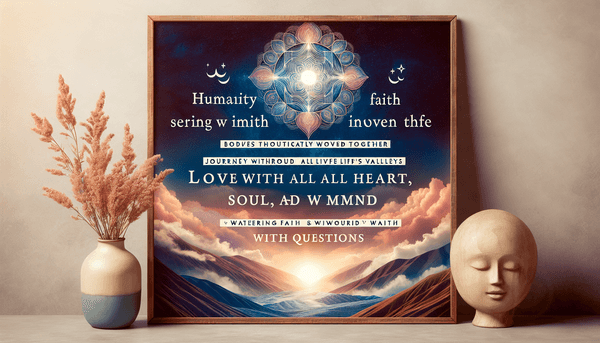The Importance of Spiritual Compatibility in Relationships
As we traverse the journey of faith, the Bible serves as a compass, particularly when it comes to relationships. The counsel given in 2 Corinthians 6:14 cautions believers about the spiritual implications of being 'yoked together with unbelievers,' highlighting the potential for conflicting values and priorities. This is especially poignant in romantic relationships, where spiritual harmony can greatly influence one's faith journey. Similarly, friendships with non-believers, while not forbidden, require mindfulness, as the Bible teaches us that 'bad company corrupts good character' (1 Corinthians 15:33). Yet, the scripture also calls us to demonstrate love and kindness, as shown in 1 John 1:7, where walking in the light allows for fellowship with one another, reflecting the balance between loving engagement and spiritual discernment.
The Connection Between Resurrection and Eternal Life
In the heart of Christian belief lies the resurrection of Jesus Christ, a cornerstone that assures believers of the promise of eternal life. The Gospel of John eloquently states, 'I am the resurrection and the life. Whoever believes in me, though he die, yet shall he live' (John 11:25-26). This profound connection underscores that through faith in Christ's resurrection, believers are granted the hope of eternal life, a theme Paul further expounds upon in his letters, particularly in 1 Corinthians 15:20-22. It is the resurrection that validates the Christian's hope, granting a future that transcends the power of death, as affirmed in Romans 6:4-5 and Revelation 20:6.
The Lessons from Judges 1-2: Obedience, Compromise, and Divine Faithfulness
The historical narrative in Judges 1-2 presents a stark lesson on the consequences of disobedience and compromise. The Israelites’ failure to fully obey God's commands led to a cycle of sin and redemption, a pattern that speaks volumes about human nature and divine mercy. As we reflect on these ancient stories, we are reminded of the importance of steadfast obedience, as partial compliance can lead to spiritual decline. Yet, in the midst of human frailty, God's faithfulness remains constant, providing hope and redemption for those who turn back to Him. The story of Judges echoes through the ages, reminding us that 'to obey is better than sacrifice' (1 Samuel 15:22).
Conclusion
Through the lens of these dialogues, we have explored a range of biblical concepts that are as relevant today as they were in ancient times. The Bible offers guidance and reflection for the earnest seeker in every aspect of life. Whether it is navigating relationships with spiritual discernment, embracing the hope of resurrection and eternal life, understanding the depth of Jesus' parables, grappling with the gravity of sin, or learning from the historical cycles of obedience and redemption, each topic invites us to reflect on our faith and actions as we journey towards a deeper understanding of God's word and His will for our lives.
FAQ
Q: Can you date a non-believer?
A: The Bible advises caution when dating non-believers due to potential conflicts in values and beliefs, as seen in 2 Corinthians 6:14. However, it's important to seek individual guidance and wisdom in such personal decisions.
Q: Can you be friends with a non-believer?
A: Yes, Christians can be friends with non-believers, showing love and kindness to all. The key is to be mindful of the influence of these relationships on one's faith.
Q: Can you be friends with people who don't believe in good?
A: Friendship with individuals who hold different beliefs, including those about the nature of good, is possible, but it requires discernment to ensure that one's own faith is not compromised.
Q: What is the connection between resurrection and eternal life?
A: The resurrection of Jesus Christ is essential to the Christian faith, as it signifies the defeat of death and opens the path to eternal life for believers, as expressed in John 11:25-26 and 1 Corinthians 15.






